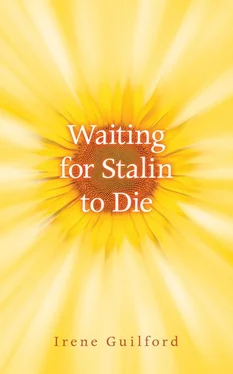The store’s threshold was mosaic, a half-moon of small pink and white stones. Pushing the door open, she entered a golden honeycomb. Cubbyholes ran up the walls from floor to ceiling. Packets and small soft boxes filled every pocket. A white-haired man in a white coat, working behind a chesthigh counter at the back, took note of her over his rimless glasses.
Watch if you like, Mr. Pharmacist, she thought, passing up and down the aisles, but I’ve fooled Nazis and Russians. I can fool the likes of you.
She stopped at the Kotex. He lowered his gaze to his work.
She drifted up and down the aisles, peering at stockings and hairnets and bobby pins. Stopping before the Aspirin, she examined the small metal tins with red and grey stripes. She scooped one up. Hah, Mr. High and Mighty Pharmacist, she thought. What do you think of that? And slipping it into her pocket, she sauntered towards the door.
“Come here, young lady,” he said without looking up.
She approached, a naughty child drawn by a commanding parent. Removing his glasses, he pinched the bridge of his nose. He fixed his eyes upon her. His look was stern and direct. It also held kindness and understanding.
“I have three daughters. The two older ones are sensible but the youngest, well, she’s always wanting things. Sadie, I say, just because you want something doesn’t mean you can have it. Things are not important. It’s people who matter. And do you know what else I say?”
Birute shook her head, open-mouthed and feeling a bit like Dobilas.
“I tell her to look around. Look at those less fortunate. Some people have nothing. Not even medicine.”
He turned to the cubbyholes, lingering with his back towards her. Suspended in the effervescence of his kindness, she wanted to reach out and touch his shoulder. Your daughters are lucky to have such a father, she wanted to say. Especially that Sadie. And grasping the small metal tin in her pocket, she slipped away.
She found her brother in his office, working on his sermon. Writing at his desk in his dark cassock, pen in hand, he seemed to her the very picture of a priest. He looked up faintly irritated. He was no longer the brother with whom she had roamed through fields at home. And standing before him, she kept her hand casually yet purposefully in her pocket.
“What have you got there?” he said, looking up.
“Nothing. Nothing that would interest you.” She closed her hand over the tin even more tightly, holding onto the goodness a little longer.
“Let me see,” he said, coming around from behind the desk.
He pulled her hand out of her pocket. She opened her palm, revealing the purloined tin. She did not resist. She wanted him to see it. She wanted to show the full force of her unhappiness.
“What’s this? Where did you get this?”
“The pharmacist gave it to me.”
“Oh, he just gave it to you, did he? Don’t lie to me, Birute.”
“I’m not lying.” She lied very well and knew it. She could even lie to herself while pretending not to.
“Stealing. Lying. My own sister. And before the eyes of God, too. What am I going to do with you?”
“Oh quit being so holy. You were just my brother once. Before Mother and Uncle Raimundas got hold of you. Before you got turned into a priest.”
For a moment, he was silent.
“But I am a priest now,” he said. He might have become one out of circumstance rather than vocation but in exile, God had granted him a purpose. He had found his true calling. His real work had begun.
“If God is so important to you,” she sniffed, “then you go be with him.”
“God loves all of us, Birute. He includes you in his grace.”
“Hah. First, he takes you away from me. Then you take me away from home.”
“Birute,” he said, “think of those who have suffered. Those left behind. Those who have died. Those still separated.” Every week, the columns of Tėviškės Žiburiai were filled with husbands and wives looking for one another, for brothers and sisters, aunts, uncles and cousins.
“You always used to have time for me. Not here. Not now. We always used to be together. What am I to do here without you?” Tears gushed now, words spluttering out along with them. “I’m not going to become an old maid looking after priests. I made a mistake once. And maybe no one will want me because of that,” her voice quavered, “but I’m not going to spend my life praying and feeling sorry.”
She shook, releasing feelings long held inside, thoughts long avoided.
“What do you want?” Jurgis said.
“Someone who wants to be with me.”
“But I am with you.”
“No, you’re not. You belong to your parish, to everyone except me.”
He sighed. “We are still together. And we are safe.”
“We should never have left home.”
They stood together in silence, side by side but separate for the first time in lives always lived together.
“We may not be together as we once were,” Jurgis said, “but we are safe.”
“Maybe we are safe,” Birute said, “but we are no longer together.”
They turned away from one another, bewildered and discomfited.
Chapter 3

Father Geras thought a priest’s duties much like a doctor’s, one tending the body, the other shepherding the soul. Following in Dr. Prizura’s wake at St. Joseph’s Hospital, visiting ailing parishioners, he would feel the clutch of their hands and see the urgency in their eyes. He would offer prayer and comfort. He would administer last rites. And grieving for souls who had reached safety only to depart this earth, he would think of his cemetery.
He entered the room of Mrs. Vitkunas, an old woman pinned to the bed by the relentless sunlight, age and illness exposed by the pitiless bright light of day. Her eyes were shut. She breathed fitfully. As he moved forward, her eyes flew open.
“Oh, it’s you, Father,” she said, her hand fluttering up towards him. “Thank you for coming to see an old woman.”
“God is with you,” he said. “He loves you and will take care of you. He will prepare a place for you by his side. He takes all of us into His grace. When we go to him, we see not only Him but all those whom we have lost and loved.”
He lowered himself onto her bedside, ready to hear her confession. Listening, he heard her whispers through dry lips. Dear God, he thought. Such small sins, light as air. And making the sign of the cross over her, he felt her sigh of release.
They talked quietly then of the place from which they had come. Holding her hand, helping her to remember, they spoke of the mother and father left behind, the land lost. The skin was loose and freckled. He felt the bones beneath. And running his thumb along the ridges, he wished the hand were his mother’s.
“Let us pray to Almighty God Our Father. Let us ask for his forgiveness, his mercy and his love.”
They lowered their heads, the sunlight almost forgiving now upon their necks. He led her in prayer, his voice containing the strength of this world, hers feeble with imminent departure. Please God, do not take her yet. Do not let her rest among strangers. And bending his head, he prayed for this poor soul flung to a foreign shore and for his country’s freedom.
Father Geras wrote to Bishop Bennett in Montreal, applying for funds to build the cemetery. He described the plight of his people, scattered by war and lost in a new land. He asked the Bishop’s kind indulgence. He hoped for the Bishop’s beneficent understanding. And calling upon the image of a flock in need of shepherding, he put down the earnest feelings in his heart.
Читать дальше













